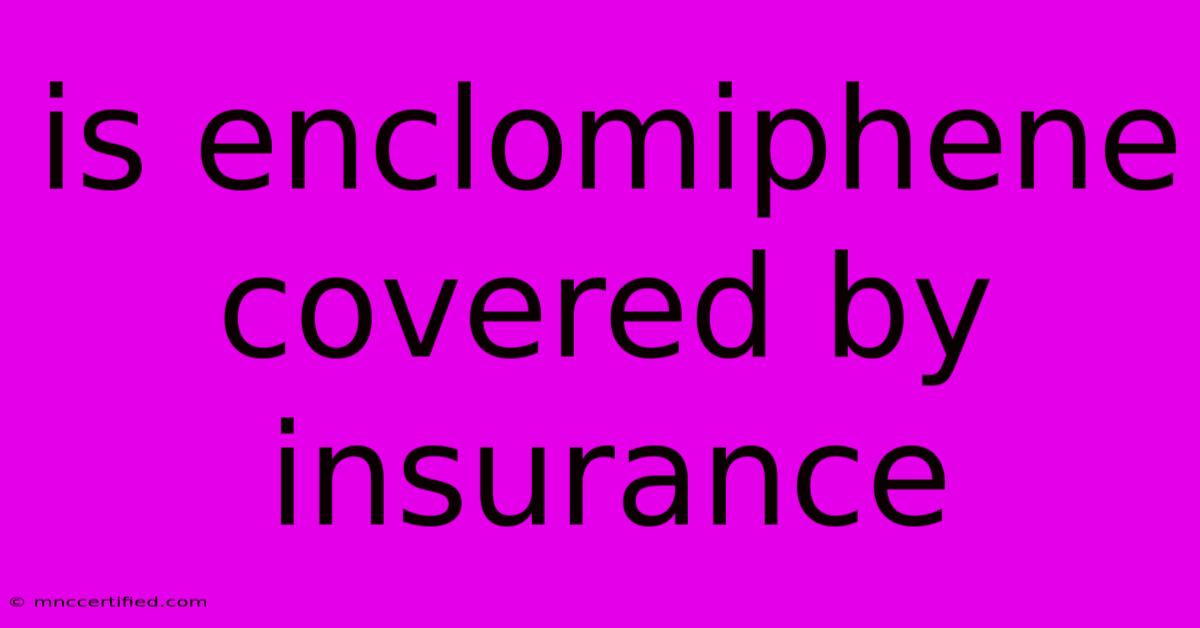Is Enclomiphene Covered By Insurance

Table of Contents
Is Enclomiphene Covered by Insurance? A Comprehensive Guide
If you're considering Enclomiphene as a treatment option, you're likely wondering about its insurance coverage. This article will guide you through the complexities of insurance coverage for Enclomiphene, helping you understand what factors influence coverage and how to navigate the process.
Understanding Enclomiphene and its Uses
Enclomiphene is a medication used to treat female infertility caused by anovulation, a condition where the ovaries don't release an egg. It belongs to the selective estrogen receptor modulator (SERM) class of drugs, similar to clomiphene citrate (Clomid).
Factors Affecting Insurance Coverage
Coverage for Enclomiphene can vary widely depending on several factors:
1. Your Insurance Plan:
- Type of Insurance: Different insurance plans have different formularies (lists of covered drugs). Some may cover Enclomiphene while others may not.
- Coverage Level: Your plan's coverage level (e.g., bronze, silver, gold) can also influence coverage. Higher tiers typically offer wider drug coverage.
2. Your Individual Circumstances:
- Diagnosis: Insurance companies usually require a confirmed diagnosis of anovulation for Enclomiphene coverage.
- Prior Treatments: Previous infertility treatments you've undergone can impact coverage.
- Pre-Authorization: Many insurance plans require pre-authorization before covering Enclomiphene. This involves obtaining approval from your insurer before starting treatment.
How to Determine Coverage
1. Contact Your Insurance Provider:
- The most reliable way to know if your plan covers Enclomiphene is to directly contact your insurance provider. They can provide specific details about your plan's coverage and any necessary pre-authorization requirements.
2. Utilize Your Insurance Provider's Website:
- Many insurance providers have online tools that allow you to search for drug coverage based on your plan.
3. Check with Your Healthcare Provider:
- Your doctor or fertility specialist can also assist you in determining coverage and guide you through the pre-authorization process.
What to Do if Enclomiphene is Not Covered
If your insurance plan doesn't cover Enclomiphene, consider these options:
- Explore Other Treatment Options: Discuss alternative treatment options with your healthcare provider.
- Appeal the Coverage Decision: You can appeal your insurance company's decision if you believe it was made in error.
- Seek Financial Assistance: Explore financial assistance programs or foundations that support infertility treatment.
- Consider Self-Payment: While costly, you can choose to pay for Enclomiphene out of pocket.
Tips for Navigating Insurance Coverage
- Keep Detailed Records: Document all conversations with your insurance provider and healthcare provider.
- Seek Professional Guidance: Don't hesitate to seek advice from a patient advocate or fertility specialist regarding insurance coverage.
- Be Persistent: The insurance process can be complex. Be persistent in your efforts to understand and secure coverage.
Remember: This information is intended for general knowledge and should not be taken as medical or legal advice. It's essential to consult with your healthcare provider and insurance company for personalized guidance.

Thank you for visiting our website wich cover about Is Enclomiphene Covered By Insurance. We hope the information provided has been useful to you. Feel free to contact us if you have any questions or need further assistance. See you next time and dont miss to bookmark.
Featured Posts
-
Justin Welby Reasons For Resignation Calls
Nov 12, 2024
-
Welby Faces Resignation Calls Amid Controversy
Nov 12, 2024
-
Yellowstone Confirms Costners Departure
Nov 12, 2024
-
Bond Number 9 Starry Nights Cologne
Nov 12, 2024
-
Early Times Bottled In Bond Near Me
Nov 12, 2024